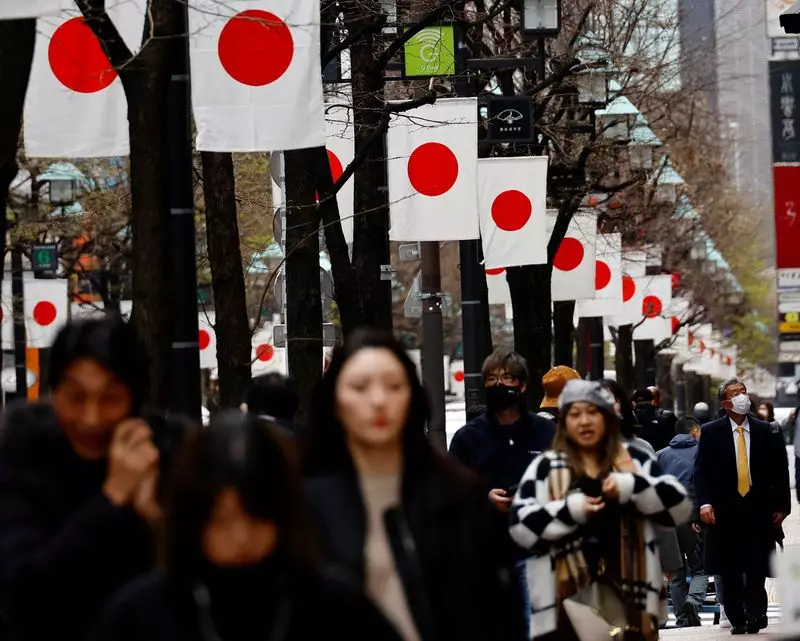Recent data from the Bank of Japan (BOJ) reveals that sentiment among Japan’s major manufacturers has shown a slight uptick in the final quarter of the year, as indicated by the latest tankan survey results. This improvement could signal a gradual shift towards more favorable economic conditions, suggesting that the central bank’s ambitions to raise interest rates from historically low levels may be on a solid footing. However, challenges such as rising costs for materials and labor remain prominent concerns for various sectors, particularly among non-manufacturers, as the survey underscores a mixed economic outlook.
The survey reflects a nuanced reality: while there is optimism reflected in increased manufacturing activity—particularly in the auto sector—there are still underlying worries about external factors that could impact growth. The headline index measuring big manufacturers’ confidence rose to +14 in December, a modest increase from +13 in the preceding quarter. This uptick is indicative of the highest confidence level seen since March 2022 and surpassed analyst expectations of +12. Saisuke Sakai, chief economist at Mizuho Research & Technologies, pointed out that the resilience observed in manufacturing amid the slowdown in China’s economy presents a positive narrative for the BOJ’s policy objectives.
Despite the overall improvement in sentiment, the survey also highlighted stark differences between various sectors. While manufacturers, particularly in automotive and technology, exhibited a more upbeat outlook, non-manufacturers faced a tougher landscape. Retailers, hoteliers, and restaurateurs grappled with fewer available workers and soaring operational costs, stunting their confidence. The sentiment among these sectors dipped significantly as they reported challenges in adequately staffing their establishments, reflecting an overarching trend of labor shortages.
Kazutaka Maeda, an economist at Meiji Yasuda Research Institute, noted that although domestic tourism demand remains robust, it faces a plateau, which could further amplify the pressures on businesses struggling to meet customer needs. In light of slowing household spending and rising inflation, the cautious sentiment among non-manufacturers serves as a stark reminder of lingering economic vulnerabilities.
Interestingly, the survey also revealed that major companies expected capital expenditures to increase by approximately 11.3% in the current fiscal year, slightly above prior estimates. This suggests a willingness among larger firms to invest in growth despite uncertainty in the global economy and rising costs. With many businesses prioritizing capital investments as a means of maintaining competitiveness, their optimism could help sustain the overall economic momentum needed for recovery.
On the flip side, companies remain acutely aware of rising pressures from both internal and external sources. Issues such as high raw material costs and the potential ramifications of changing trade policies under the new U.S. administration could dampen the positive outlook, leading to cautions expressed towards economic growth prospects in the near term. The anticipation of higher tariffs has emerged as a significant worry that could particularly weigh on Japan’s automotive industry, which is significantly reliant on American markets.
The tankan survey also indicated that companies across sectors expect inflation to remain above the BOJ’s target of 2% over the coming years. This sentiment is crucial as it validates the ongoing discussions surrounding the BOJ’s monetary policy. With inflation expectations stabilizing, the groundwork may be laid for further interest rate hikes in the near future. Governor Kazuo Ueda has reiterated that the central bank remains committed to monitoring economic developments and would consider rate adjustments contingent on persistent price and wage increases, aligning with the goal of achieving sustained inflation.
However, the consensus among economists suggests that the BOJ might take a cautious approach in the immediate future, preferring to closely observe the evolving risks from global markets before finalizing any decisions on monetary tightening. The sentiment diffusion indexes used in the tankan reflect a delicate balance, with a positive reading signifying a prevailing optimism over pessimism amongst respondents. The intricacies of Japan’s economic landscape underscore the importance of ongoing planning and the need for adaptive strategies from businesses and policymakers alike.
While there are signs of recovery and cautious optimism, Japanese businesses face a landscape fraught with challenges. The mixed signals from the tankan survey encapsulate the complex interplay of confidence and caution that defines the current economic climate in Japan. As businesses navigate forward, the path to sustained growth remains uncertain, urging stakeholders to remain vigilant amid evolving global dynamics.

